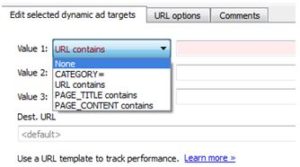AdWords dynamic search ads (DSAs) have been around for a while now, but I still get the impression that they are a PPC resource that is underused by a lot of PPC managers. The beauty of this campaign type is that, correctly used, it can serve a range of purposes in a PPC account. But let’s start from the beginning.
What is a DSA campaign?
When setting up a DSA campaign you need to specify what domain you are targeting, as AdWords actually uses Google organic search index to determine exactly what will be targeted. That’s right, a crossover between Googles paid and organic entities. As such, you need to take a few factors into account that normally would only really apply when you are working with SEO/organic rankings. The most important one is that if your site is not “crawlable” enough, DSA campaigns most likely won’t work at all. In other words, you need a very clear site structure, with subpages and URLs that are legible and make sense.

A DSA campaign does not use keywords like a standard search campaigns, instead you specify “values” or ”auto targets”, as shown in the below screenshot from AdWords Editor.
Why DSAs are so valuable to PPC managers
The ads used in DSA campaigns also differ from standard search ads, since the headline will be dynamically generated based on your targeting criteria.
If I am setting up a PPC account for a website that is well structured I usually always include a DSA campaign, and there is a good reason for it. As a PPC manager it is almost impossible to make sure that you cover all eligible keyword variations that someone might use. In a DSA campaign I can target a specific page and if AdWords detects that the search term used is relevant for the targeted page my DSA ad will be triggered, a headline will be populated, and maybe most importantly you will be able to see what search terms that triggered my ad in the search query report later.
This means that a DSA campaign can be really useful in the initial stages of a PPC account, because it allows you to discover potential keywords that people are actually using to click through to your website. These search terms can then be added as standard keywords and added as negative keywords in the DSA campaign.
Avoid duplication
To avoid competing against your own campaigns you should obviously make sure that you always exclude any exact match keywords that you are running in any standard campaigns before activating your DSA campaign. You also need to make sure that you have a very comprehensive negative keyword strategy in place. In a similar way to using keyword insertion in ad copies you might generate some strange headlines if you have not carefully reviewed the content of the targeted pages that you want to use.

If, for some reason, you are not seeing any traffic coming through your DSA campaigns there is a quick way of diagnosing if your targeting is eligible to pick up any traffic. In the AdWords interface, navigate to the campaign and click on “auto targets”. You should see the below view, which will show you how big your website coverage is for each ad target, if 0% you will need to amend your targeting criteria. One thing worth noting is that you need to wait 24 hours after creating the campaign before it will pick up any traffic.
Due to the organic targeting I have experienced different results with DSA campaigns in different accounts. There is also a certain degree of unpredictability that you need to get past. I have seen CPCs for high converting keywords being significantly lower in DSA campaigns than in standard search campaigns and I have also experienced some amazing conversion rates.
Google says yes
Google recently launched an update aimed towards a more efficient and easier target setup (you will now automatically get recommended categories to target based on what Google can detect on your targeted domain). This is a clear indication that this is a campaign type that Google believes strongly in for the future, and that means that you probably should get on board too!


